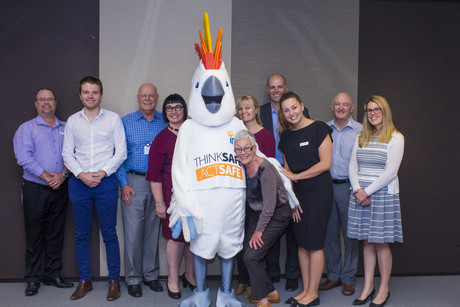
A giant cockatoo is playing a critical part in helping to improve workplace safety for one aged-care provider.
Illawarra Retirement Trust (IRT Group), a community-owned seniors’ lifestyle and care provider, has launched a comprehensive safety plan with a cockatoo mascot named Work Safe Wally as its centrepiece.
“The Australian sulphur-crested cockatoo was chosen [because it] encapsulates customer centricity, as it is a community-based animal; empowerment, as it calls out danger; and accountability — it’s a social and caring animal,” said IRT Group Head of Health Wellness and Safety Andrew Holman, who developed the concept of the mascot.
During 2017, IRT implemented its safety program, which was focused on empowering staff to make safe choices and hold one another to account. Increased training was rolled out across the organisation, with an aim to improve communication between staff and the company’s safety management systems.
Since the program has been in action, IRT has reported a 48% reduction in lost time injuries (LTIs) and a 32% reduction in medical treatment injuries (MTIs). The company’s most common mechanisms for injury have included manual handling; slips, trips and falls; customer behaviour; contact with hot objects; and being hit or hitting objects.
Meanwhile, the top five injuries sustained by workers include lower back strain, upper back strain, shoulder strains, burns and laceration or bruising.
As part of its safety campaign, a number of workshops were held across the business to develop the Work Safe Wally mascot concept. Rockshelf Pictures helped to create a three-dimensional design for the cockatoo, while costume suit manufacturer ODDBODDS turned the illustration into a wearable mascot costume.
“The main challenge was designing a character which had a physique of a cockatoo which did not look like a human in a baggy suit with a foam head. Initial designs made Wally look very obese, as a cockatoo does not have a vertical posture as a human does,” said Holman.
Employees were engaged in naming the cockatoo via a naming competition on IRT’s Facebook communication channel.
“We then launched Work Safe Wally to all employees via an animation video, created by Rockshelf Pictures, followed by roadshows to our communities and digital communications. Our safety slogan, ‘Think Safe, Act Safe’, is at the forefront of all our Work Safe Wally collateral,” said Holman.
“Since introducing Work Safe Wally across IRT, not only have we seen our people more engaged in safety at work, but we’ve also seen increased awareness of safety among our employees — they now think about safety when they see a real cockatoo either at work or in their personal lives.”
Wally is now a key driver of safety initiatives across IRT, including Move4Life, Gemba Safety Walks, monthly safety topics, such as manual handling, and wellness events, such as Steptember. He is regularly invited to attend management meetings, employee training days and resident events across IRT.
“IRT current have 19 care facilities — I plan on Wally visiting each site twice this year to undertake a Gemba Safety Walk and wellness promotions in 2018,” said Holman.
Supporting the wellbeing of Australia's firefighters
Academics Dr DAVID LAWRENCE and WAVNE RIKKERS detail their continuing research in the area of...
Software-based COVID-19 controls help protect onsite workers
The solution decreases COVID-19-related risks by ensuring that contractors and visitors are...
Spatial distancing rules: are they insufficient for health workers?
Researchers have revealed that the recommended 1- to 2-metre spatial distancing rule may not be...









